Late Dr P. C. Shejwalkar: Academician with an Indefatigable Spirit
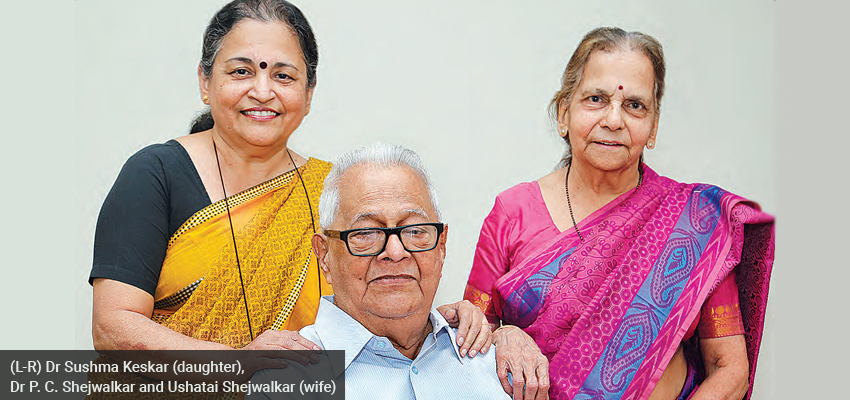
Dr P. C. Shejwalkar, the father of management education in Maharashtra, passed away last month at the ripe age of 92. He was a friend, philosopher and guide to hundreds of management students who passed out from the Institute of Management Development & Research (IMDR), which was his brainchild. His admirers include top-notch professionals and entrepreneurs in the corporate world as well as academicians and researchers spread across Maharashtra. Corporate Citizen pays a tribute to the legendary scholar through the words of some of the many who were close to him
The essence of my life is not always to conquer but to fight well; not to triumph but to struggle. I have struggled my entire life but with the difference that I always emerged successful, though slowly-one step ahead, each time
- Dr P. C. Shejwalkar
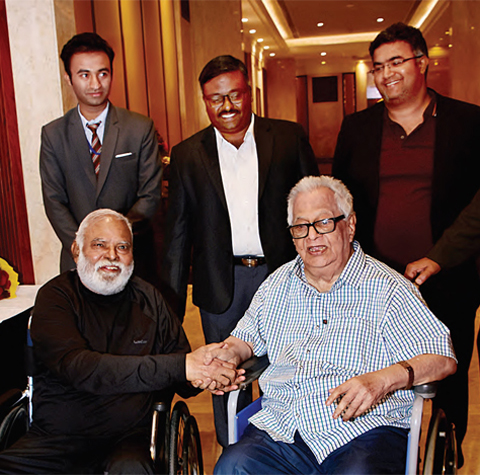 Dr (Col.) A Balasubramanian, Chancellor, Sri Balaji University,
Dr (Col.) A Balasubramanian, Chancellor, Sri Balaji University,Pune (SBUP) and Editor-in-Chief, Corporate Citizen magazine,
wishing Dr P. C. Shejwalkar on his 92nd birthday
He is unarguably the Father of Management Education in Maharashtra. At a time when management education was unheard of in Maharashtra in the 1970s, Dr Shejwalkar persuaded the University of Pune to launch a full-time, post-graduate course and thereafter, founded the prestigious Institute of Management Development and Research (IMDR). He stepped into an unknown territory when he made IMDR an autonomous institute by weaning it away from the university and created history. He also inspired several others to follow the suit.
Shejwalkar stands tall in the educational field for his innovation, enterprise and relentless pursuit of excellence.
After his long stint at IMDR which is synonymous with his name he founded the Institute of Management Education (IME) and served as its Founder Director, after his retirement from IMDR in 1989. He continued to go to the IME office till the day before he passed away.
His zest for life was insatiable. With childlike passion, he yearned to improve the educational sphere through his writings, speeches and correspondence with the powers-that-be. He described his work as “enjoyment’’ and therefore, happily engrossed himself in his work until he died with the proverbial boots on. A heartfelt tribute…
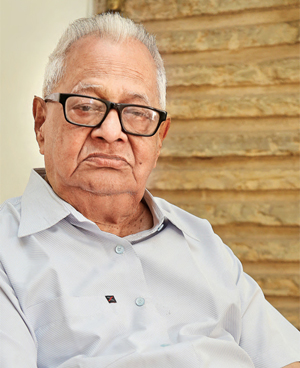
He was scholarly and loved people
“It is difficult to talk about your own family members, but my memory of my father is that he was always busy with his work and study,” says his daughter and academician Dr Sushma Keskar. She recalls, “At times, he didn’t spend much time with his family. Despite that, he used to take me on his bicycle, hoisted on the small seat (in front), to his friends’ houses. He used to also take me to Sarasbaug once in a while. Although I was the only child, I was raised by my parents just like other children.”
“The environment in the house was conducive to studies, as there used to be lots of books at home, mostly on subjects my father studied or taught. I used to read them with great interest. That’s how I was inspired to take up the same profession as my father’s.”
Dr Shejwalkar was a very social person and could make friends with any age group, including children, with whom he would get down to their intellectual level. Citing an example, Sushma states, “When my children were small, they had a lot of friends, with whom they played in the lane. My father would tell them stories in such a dramatic manner that they enjoyed them and treated him as one of them.’’
States Ushatai, his wife, and a pillar of support for Dr Shejwalkar, “He was never interested in the house as he was all the time with people. He was very scholarly and read a lot. One of the mental ex-ercises that he did, particularly in the last few years, when he feared forgetfulness, was to make every effort to remember the word he couldn’t recollect that he wanted to use. He had a fascination for improving his vocabulary and so would learn new words from the dictionary and go on repeating them until he attained perfection in their use and recollection. He was in good spirits until two days of his passing away.’’
That his enthusiasm for life and writing had not faded is borne out by the fact that he expressed his desire to write books. A day before he died, Ushatai says that he had bought a new wheelchair as he was taking a lot of time to walk from the lift to his office room. However, he never got to use the wheelchair. He died, like they say, with his boots on!
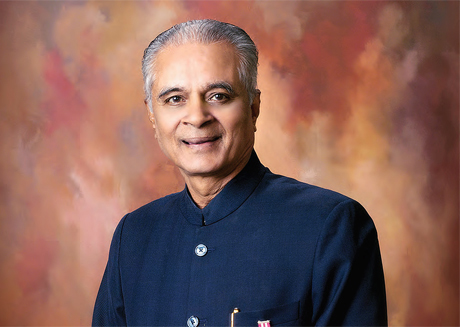
He was generous and never envious
“I got to know Dr Shejwalkar in 1964-67 when I just joined Fergusson College as a Botany lecturer. Our bungalows were opposite each other’s and so the two families got close to each other. Hence, Dr Shejwalkar is the only academician who knows Symbiosis since its inception. He has had a ringside view of all the difficulties and teething troubles that we underwent to make it into an educational institution of international culture to its becoming an internationally acclaimed deemed university.
Dr Shejwalkar was keen that I become a life member of the Deccan Education Society (DES), but it was not to be. Later, he told me that it was just as well or I would not have thought of starting Symbiosis. Although he was much older than me, he treated me as his equal. That was his greatness.
He held several coveted posts like being on the Academic Council and Senate of the Pune University but he was so humble. He never hurt anyone either by his words or his behaviour. He, therefore, had no enemies. He was the first one to start a management institute in Pune. When he launched it in 1977-78, he took the bold step of de-linking it from the University and making it an autonomous institute. This gave him the freedom to chart out its own syllabus that was more dynamic and helped upgrade its status. He quickly got students from various fields. His magnanimity lies in the fact that he asked me to start a management institute too and thus was born the Symbiosis Institute of Business Management (SIBM) thanks to his encouragement. He was generous and not envious at all – such was his rare quality.
Not many know that Dr Shejwalkar had a spiritual bent of mind. He has written 30-40 articles on spirituality in the popular Prasad magazine. He perhaps has the unbeatable record of guiding 80-83 PhD students in varied disciplines. These students are spread out in various villages, talukas and districts and consider him as their guru. He is respected by all teachers too”.
DR S. B. MUJUMDAR, Chancellor, Symbiosis University
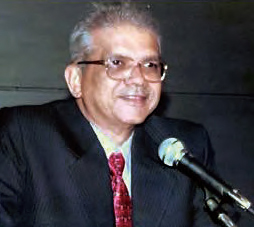
Work was his passion
“I remember when our first batch of the Department of Management Sciences (PUMBA) started in 1971, it was formally inaugurated by Governor Ali Yavar Jung. It was sponsored by Dr Beck and inaugurated at the Dnyaneshwar Sabagruha Hall. The who’s who of the industry was invited. A day before, Dr Shejwalkar’s mother had passed away. He went for the funeral to Thane but the next day the event took place as scheduled. That was the intense level of involvement in his work.
He was very popular as a teacher too. As Vice Principal of BMCC College, he would work from 12 noon to 5.30 PM and then go to PUMBA where he was the Head of the Department (HoD) of PUMBA. Ours being the first batch, all of us 30 students were very closely associated with Dr Shejwalkar. One of the students migrated to the USA and another went to ITI so finally, we were 28 students. He knew each and every student at a personal level and he was so friendly that he would even come to movies with us.
Virtually, the who’s who in academics and industry, including CEOs of several manufacturing companies were close to him. As a result of his excellent relationship with them, our guest faculty were very high profiled, which was so crucial to the education quality and reputation of the institute. I remember that the first guest lecture was by Prakash Tandon, CEO of Hindustan Lever, a corporate stalwart who later joined SAIL as its Chairman.
As my father-in-law, he was very caring and always very objective. His priority, though, was academics. He is the one who inspired me to change my course from industry to academics. Initially, I was working in a manufacturing company as a marketing manager. I had to travel 20 days a month and that was quite strenuous. Subsequently, I began teaching at Indsearch in 1998. I turned full-fledged into teaching and then did my PHD”.
PROF. ANIL KESKAR,
Advisor, Management Studies, Dr. D. Y. Patil Vidyapeeth (Son-in-law of Dr. P. C. Shejwalkar)
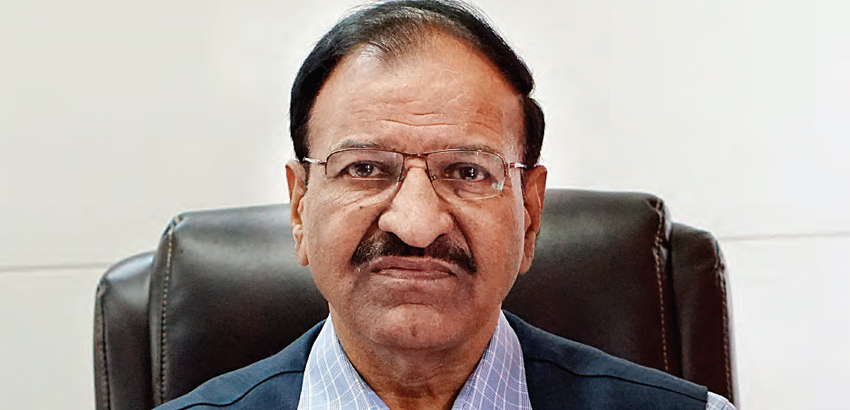
Life of Patience, Purity and Perseverance
“I had known Dr Shejwalkar for more than four decades ever since my Post Graduation days at the Gokhale Institute of Politics and Economics in 1977. After our library closed at 6 PM, the college, as well as the BMCC Road wore a deserted look. However, I observed that the newly established Institute of Management Development and Research (IMDR) down the road, which had classes in the evening, was full of activity, with many two-wheelers and a lot of lighting on the premises. Curiosity prompted me to visit it after my library hours.
I saw a gentleman seated in a chair outside, observing everything around him. When he saw me, he called me towards him and asked me as to whom I was looking for. I told him I was keen on knowing the activities there. He keenly enquired about me, my family background and my current activities and then told me about the Institute and the Course - Diploma in Business Management (DBM) that he had started. The man was Dr Shejwalkar himself, and I have known him ever since. I subsequently was a visiting faculty at IME, which he started after his tenure at IMDR. After that, I met him on various occasions and had very good relations with him.
The three most impressive qualities of Dr Shejwalkar were the three Ps – Patience, Purity and Perseverance. I observed the way he tackled crises with great tenacity when he was the rector of the hostel and Vice Principal of BMCC College, Pune’s premier commerce college.
Dr Shejwalkar’s personality comprises four pillars – perseverance, truthfulness, taking up challenges and strategy. He was versatile too. Although he was known famously as the Management Guru, He has also authored several books on commerce and literature. He always respected students and parents and they, in turn, looked up to him.
As the Bhagwad Gita says,

Meaning, our mind wanders everywhere; money is squandered, youthfulness too does not remain forever. What remains permanent though is your contribution to society.
Which is amply evident in Dr Shejwalkar’s life journey, as he leaves behind his colossal contribution to education and overall society in many respects. Or it reminds me of a dohe by Sant Kabir which says,

More than your face, your reputation and constructive contribution to the growth of the society is more valuable. It can fly without wings and remain forever. Or these verses by Samarth Ramdas who says,

Meaning, you should never utter anything that will hurt others.
Every word has a specific meaning, weightage and feelings. While communicating with others use the words very carefully and see that the power of the words builds trust and healthier dialogue and relations among each other.
Dr Shejwalkar was the epitome of goodness and humility. He was very straightforward in his analysis and always steered constructive changes that were useful to the development of educational institutions. He was like a lighthouse to many of his students for making their professional career.”
PROF. (DR) G. K. SHIRUDE, Vice Chancellor, Sri Balaji University Pune.
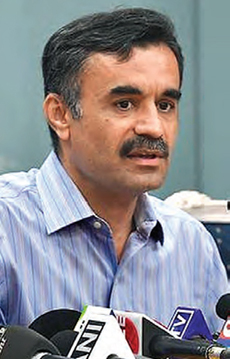
A Guiding Force
“Dr Shejwalkar was a wonderful and great person. When I was appointed Sales Tax Commissioner in 1997, I would be flummoxed with balance sheets and several other finance-related jargons. I happened to meet Dr Shejwalkar. When I asked him as to how I could get acclimatised to my new work, he said that I should do an MBA in Finance at IMDR. I was immediately taken up by that idea but of course, I would not be able to attend regular classes. When I spoke to Dr Shejwalkar about it, he said he could consider my not attending regularly as long as my academic marks were good. I kept up the promise and topped the class. This was not as important as Dr Shejwalkar’s guidance in terms of giving me the relevant books to read, not only from within the syllabus but also those that increased my knowledge in this field.
He was a man with a loving heart. I have so many of his sweet letters, which he would write to me whenever I was promoted or transferred to another posting. I’m glad Corporate Citizen is publishing a tribute on him.”